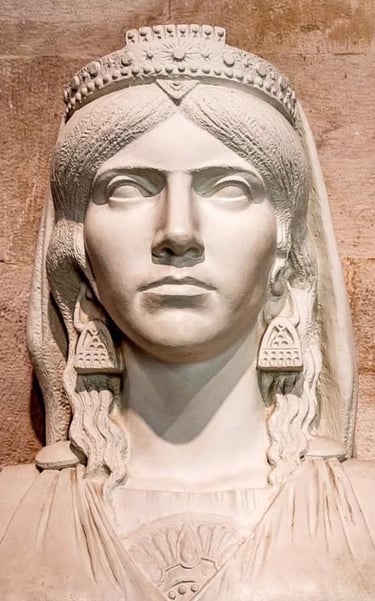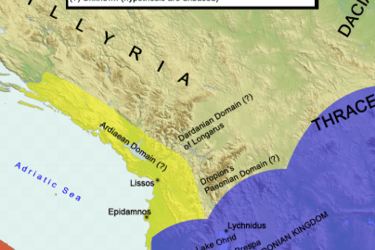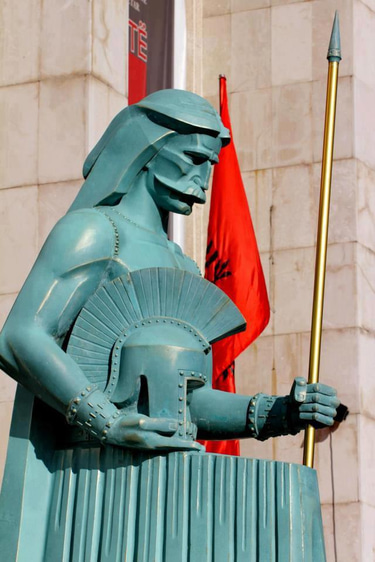
Women of power
Teuta - The Illyrian queen
Teuta, Queen of the Illyrians, a proud people of fearsome warriors and great navigators; to neighboring kingdoms, they were ruthless pirates.


In an era dominated by male warrior kings and strategists, Teuta was the Illyrian woman who, in 231 B.C., took control of the kingdom of the Ardiaei after the death of her husband, King Agron. Illyrian society was not patriarchal; Illyrian women enjoyed the same rights as men. In ancient writings and archaeological finds, Illyrian women are depicted as warriors fighting in battles alongside their men, as well as participants in banquets, toasting on festive occasions. Ancient Greek and Roman sources, leveraging her status as a woman and a "barbarian," used a ruthless judgment to interpret the events related to her as decisions dictated by excessive emotionality, as a woman. As a result, the "barbarian" queen was denied a place of glory alongside other ancient kings. However, she has come down to us through history without ever getting lost in time, and today she is seen as a figure to be redeemed, as the Queen of the Illyrians who fought for her people, charismatic and courageous as a lion.
In 230 B.C., Teuta, who would come into conflict with Rome, ascended to the throne after the death of her husband Agron, king of the Ardiaei, a kingdom on the Adriatic coast. Teuta quickly revealed her ambition and innovative talents. She was a great strategist and leader of her people, capable of continuing her husband King Agron's project of unifying all the kingdoms of Illyria to create a great Illyrian state comparable to the Balkans. During her brief reign, she gave a great boost to the economy and culture, strengthened the army to defend the borders of her kingdom, and centralized power, demonstrating strategic skills and challenging the prejudices of the ancient world.
In response to the complaints from two Roman ambassadors about pirate attacks and plundering of Roman and allied ships, Teuta replied that no royal force would touch the interests of Rome, but that she was unable to intervene in her people's pirate activities. When one of the consuls gave an insolent reply, daring to taunt her with Rome's fearsome future revenge, the queen had him killed on his way back. News of this was enough to ignite the conflict, leading to war preparations and becoming the casus belli of the Illyrian-Roman war. The reasons for this were clear: the strengthening of the Illyrian state was incompatible with Rome's expansionist aspirations, given the control of maritime routes of economic, political, diplomatic, and military importance, such as the connections from the Strait of Corfu and the Strait of Otranto.
The war was ruthless and ended with the betrayal of Demetrius of Pharos, Teuta's commander and right-hand man. He essentially handed Corfu over to the Romans and accompanied them gradually north, effectively becoming a Roman advisor. In the Illyrian center, the resistance was even more determined, and the Romans suffered heavy losses. They lost a magistrate of the republic and 20 military tribunes, and many ships were destroyed. After these fierce battles, the queen retreated to Rhizon, where she awaited the Roman offensive, which never came. At the end of that winter (228 B.C.), Queen Teuta sent an embassy to Rome, which returned with an agreement containing unacceptable conditions. She would have to leave Illyria and not sail south of Lissus.
From then on, the story of the queen of the sea is intertwined with legend and truth, where she is seen committing suicide in Rhizon at the Bay of Kotor to avoid being captured by the Romans. Unable to bear the humiliation and betrayal any longer, she supposedly threw herself from a cliff into the sea, and it is Teuta's curse that makes Rhizon the only city on the sea without a port or sailors. Others narrate that she was seen for two more decades wandering the mountains of Illyria with her mother Persena, a healer, collecting the Iris, the flower of Illyria with many healing properties, to which the gods supposedly gave the color of the queen's blue eyes, like the sea she loved so much. There are still those who seek her great treasure, hidden on her orders under the bed of a river that was moved to bury it and then returned to its course. Thus, Teuta would have wanted the great wealth gathered by the Illyrians, her people whom she loved so much and for whom she had fought so hard, not to fall into enemy hands, but to remain forever in the land of the Illyrians.








